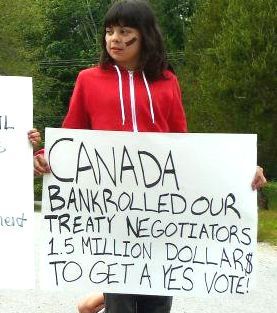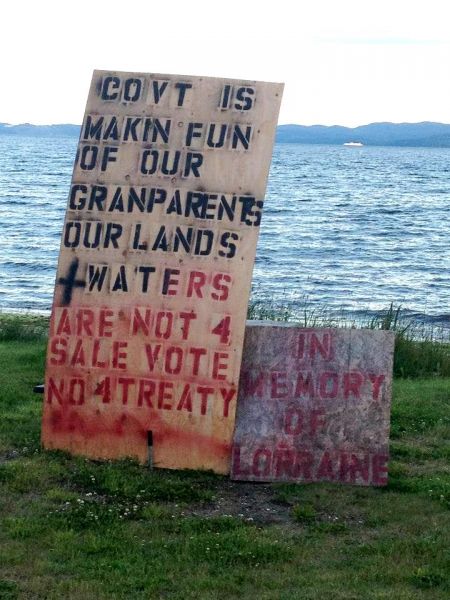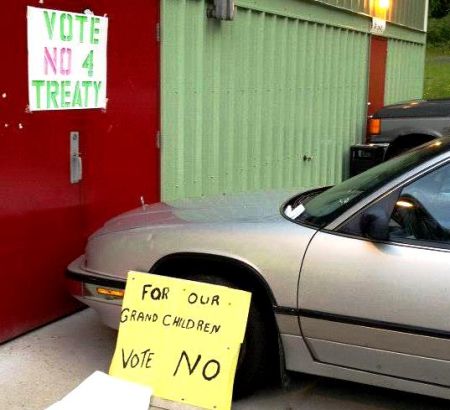STORY about Indigenouspublié le Juin 19, 2013 by Kerry Coast
First ever court victory against a “modern day treaty” in BC
Tla’amin Elders win a shot at the Sliammon Treaty Society’s Enrolment Appeal Board, where they hope to prove the need for a re-vote.
The Tla’amin Elders Against Treaty won an unprecedented concession in BC Supreme Court, although it’s hard to spot, on May 21. The Sliammon First Nation, their community spelled in the older anglicized way, may have to go to a re-vote on their Final Agreement with Canada and BC, after the new Enrolment Appeal Board has reviewed some glaring problems.
Being thrown into question is the eligibility of at least a dozen individuals who have been enrolled as Tla’amin First Nation members. The people in question will not, however, attend that review which will determine whether they should have been enrolled as a Tla’amin Member. They won’t be able to defend themselves because they are dead. They were dead at the time they were enrolled.
Perhaps a new vote without them will not result in ratification of the Tla’amin Final Agreement - the vote last summer resulted in the required 57% "yes" to treaty. A vote without them, and without other voters who were neither Tla’amin Members nor Sliammon First Nation members but allegedly friends, colleagues and more distant relatives of employees of the Sliammon Treaty Society who belong to other Bands, may have different results.
The eligibility and enrolment procedure which the Sliammon Treaty Society used to get its narrow win a year ago has been implicated in a court proceeding brought by opponents of the treaty process within Sliammon. Hereditary Chief Muksamma, Jackie Timothy, led the Anti-Treaty Elders to the wafer-thin court victory: Judge Savage said in court, according to Muksamma, that neither BC nor Canada could ratify the Final Agreement at this stage. His written ruling stated that the newly formed Enrolment Appeal Board can be used by the Sliammon now to answer the Elders’ concerns about votes cast by unlikely Sliammon members.
Lawyer Greg McDade praised and defended the Treaty Society’s “A+” enrolment procedure in court last summer, where the Treaty Society defeated the Elders who pleaded for an injunction against the vote. At that time, they had collected 223 signatures on a petition asking for a delay in the voting: “The undersigned strongly believe that everyone on the Band list should have a say on the treaty vote.” Current procedure under the BC Treaty Commission’s uniform ratification chapter is that individual Band members must enroll in the yet-to-be Treaty First Nation, a First Nation which will only exist once the people enrolled in it ratify the Final Agreement, relinquishing their membership in the Indian Band to-be-extinguished, before they can vote on the Final Agreement. There are just over one thousand Sliammon Members.
The Sliammon opponents to the treaty actually used their vehicles to blockade the doors to the on-Reserve polling station on June 16th of 2012, creating their own delay, but the court follow-up to get a written injunction was unsuccessful. Although the Sliammon Agreement in Principle had been voted down by a margin of 2% in 2001, McDade managed to persuade the judge that action to stop the treaty was now too late.
Objections to the Sliammon Treaty Society’s methods are extensive. Eammon Murphy of Woodward and Company lawfirm is representing them. Noreen Galligos-Paul, Ratification Coordinator for the Society’s voting, was apparently sending so many text-messages on June 15, the day before the vote last summer, that she mis-fired:
“Hey rib vote tomorrow (happy face) I was hoping that I can count on your support for final agreement vote tomorrow. Let me know if you have any questions.”
“Oops sorry wrong Robert”
Robbi Wilson, the Sliammon Councilor who Galligos-Paul accidentally urged to vote in favour of the Agreement, wrote a formal complaint to the Treaty Society. Other Sliammon members had been offered cash for their vote, treated to expensive boating tours of the traditional territory, and possibly been influenced by the promise of large lump-sum cash payouts to Elders in the community upon ratification of the Final Agreement. Affidavits swearing to these statements were presented to the courts last year and this Spring, finally yielding the somewhat obtuse and disinterested ruling of Judge Savage, BC Supreme Court, on May 21, which nevertheless concealed in its verbiage the real rub (follow the bold phrases):
[19] Although at times the plaintiffs made broad-reaching assertions about past wrongs, the jurisdiction of the courts, the jurisdiction or lack of jurisdiction of the Province, Canada and the Queen, the plaintiff’s core allegations in this proceeding are that the Society and others acted without or in breach of lawful authority, and contrary to the principles of natural justice in conducting the vote, the results of which they oppose.
[20] This is, in my view, properly the subject of judicial review. A tort action is a collateral attack which should not be permitted as it is contrary to the authority of the Court of Appeal in Cimaco International Sales Inc. v. British Columbia, 2010 BCCA 342 at para. 61. Moreover, there is now operative under the Final Agreement a process in place to address the very challenges which form the gravaman of the plaintiffs’ complaints, which are alleged irregularities in the enrollment and voting process.
[21] As noted by the Society, the Enrollment Appeal Board has now been established. The rules governing the Enrollment Appeal Board make provision for the very kind of challenges which are referenced in the materials before me. The decisions of the Enrollment Appeal Board are not final, but subject to judicial review under the Judicial Review Procedures Act. I am satisfied that that process is one which can appropriately address the plaintiffs’ complaints.
Revisiting the 57% “yes” vote
Aside from the concerns about how the Final Agreement was voted in, opponents of the Tla’amin Final Agreement are even more upset by the contents of the settlement itself.
The maps which depict Tla’amin Treaty Lands, the lands the new First Nation would own, use a scale of hundreds of meters. That is to say, each inch on the map represents a few hundreds of meters of land. Most stretches of Tla’amin Treaty Lands are not more than one kilometer wide.
Sliammon traditional territory crosses the Georgia Strait, or Salish Sea, at the landmarks we now know as Powell River and Comox. Their lands include the following popular Gulf Islands: Texada, Lasqueti, Denman and Hornby. There are no Treaty lands there. The Tla’amin people have unmistakable interests in the lands on both sides of the Strait which brings the map they submitted to the BC Treaty Commission, with their Statement of Intent to negotiate, to span about a hundred kilometers north-south and nearly fifty east-west, or nearly 5,000 square kilometers of coast, island, and resource rich waters.
The Final Agreement provides for 8,322 hectares (83 square kilometers) of Treaty Settlement Lands, and 1,917 hectares of this is existing Reserve land. The deal also includes a capital transfer of $29.7 million over 10 years. Tla'amin Nation will receive an Economic Development Fund of approximately $6.9 million and a Fishing Vessel Fund of $0.25 million. The Tla’amin settlement also includes three shellfish aquaculture tenures and commercial recreation tenures along several creeks.
As with all “modern BC treaties,” in ratifying this Agreement the Tla’amin will relinquish their aboriginal title “wherever it may have existed,” and release and indemnify the province, Canada, “and anyone else,” for all past harm or infringement of their title. They will retain some fishing rights, prescribed in the Agreement; cede to BC the highway that passes through their territory; submit their traditional lands and Settlement Lands to formal British Columbia Planning Processes; and give up tax free status, the constitutional status of their lands, and rights and federally supported entitlements accorded to others with Indian Status.
A letter from Muksamma to the Governor General dated June 12, 2013, advises that “I, along with the Elders, do not accept giving up our lands and resources and consider this Sliammon Band Council in breech of our Trust.”
- Vous devez vous identifier ou créer un compte pour écrire des commentaires
The site for the Vancouver local of The Media Co-op has been archived and will no longer be updated. Please visit the main Media Co-op website to learn more about the organization.



